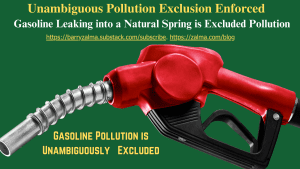Unambiguous Pollution Exclusion Enforced

Post 4842
See the full video at https://rumble.com/v58b9hg-unambiguous-pollution-exclusion-enforced.html and at https://youtu.be/c4o79XSt6gc
In Erie Insurance Exchange v. SHRI BRAMANI, LLC; ERIC MOBERLY; KAP LEASING, INC.; KEVIN MOBERLY; MOBERLY BROTHERS PROPERTIES, LLC; AND PRADIPKUMAR PATEL, No. 2023-CA-0169-MR, Court of Appeals of Kentucky (July 19, 2024) the Court of Appeals was asked to reverse a trial court that the insurer’s pollution exclusion did not exclude coverage for the negligent leakage of gasoline from one of the insured’s underground fuel storage tanks onto the neighboring real property owned by Appellees.
BACKGROUND
The Policy
Erie issued a commercial general liability policy of insurance which covered the premises and the operation of the convenience store and gas station on Lane Allen Road. The policy was in force until June 12, 2020. The policy generally provided coverage for legal liability to third parties arising out of bodily injury, property damage, or personal and advertising injury. As with most policies of insurance, the policy contains several exclusionary clauses including an exclusion of coverage for injuries or damages caused by “pollution.”
The Gas Leak
On or about October 17, 2019, the Kentucky Division of Waste Management (“KDWM”) received a telephonic complaint of petroleum odors around the Lane Allen Food Mart. A KDWM official was sent to investigate and noted what appeared to be petroleum leeching through a groundwater spring. Further investigation and testing indicated that the petroleum was coming from one of the Lane Allen Food Mart’s underground petroleum storage tanks.
Lane Allen Food Mart entered into an Agreed Order with the Energy and Environment Cabinet admitting that it had violated Kentucky Revised Statutes (“KRS”) Chapter 224, and the statute’s accompanying regulations, as related to its underground petroleum storage tanks. Pursuant to the Agreed Order, Lane Allen Food Mart consented to an assessed penalty of ten thousand dollars for the agreed-upon violations.
Post-Leak Events
Following discovery of the fuel leak, Moberly Brothers made a claim against Lane Allen Food Mart. Moberly Brothers alleged that the fuel leak caused it to suffer economic harm as a result of widespread, permanent environmental contamination. Specifically, Moberly Brothers asserted that the leaked fuel entered and contaminated a natural water spring located on its property, which rendered the property unfit for the bottled water facility that was planned for the property. Erie denied the claim based on the pollution exclusion contained in the policy. Erie agreed to defend the claim against the Lane Allen Food Mart under a reservation of rights. Subsequently, Erie filed a separate action against its insureds and Moberly Brothers.
ANALYSIS
Kentucky Courts have always strongly adhered to a policy of protecting the reasonable expectations of policyholders. Although insurance carriers have the right to impose reasonable limitations on their coverage, the question then becomes the reasonableness of the condition as a limitation on public policy as opposed to one of strict contract considerations between private parties where no public interest is involved.
Most consumers would recognize that gasoline is a product that becomes a pollutant when it leaks into the ground and contaminates soil and water. Even a valuable and useful product like gasoline can become a pollutant when it contaminates a natural resource.
The focus of the inquiry under the absolute pollution exclusion is not on the nature of the substance alone, but on the substance in relation to the property damage or bodily injury.
Nature of the Alleged Damage.
Where the purported pollutant results in “contamination, negative health or environmental effects,” the exclusion is enforceable. Moberly Brothers alleges significant environmental damage to its real property due to the gasoline that leaked from the Lane Allen Food Mart’s underground storage tank. Moberly Brothers alleged in its complaint that the petroleum gasoline damaged and contaminated its property and seeks damages to restore and recover the use and value of the property. This is precisely the type of pollution-related damage that falls within the scope of the exclusion.
Gasoline is clearly a pollutant when it leaks from an underground storage tank and enters a neighbor’s land and contaminates the water and soil thereon. Because the pollution-exclusion clause is unambiguous, the property damages suffered by Moberly Brothers are not covered by Erie’s policy of insurance, and the trial court therefore erred in entering a judgment against Erie. The judgment was reversed and remanded for entry of a declaratory judgment in Erie’s favor.
No insurance policy covers every potential risk of loss. Almost every liability policy has a pollution exclusion. Since gasoline, escaping into the land, is obviously a pollutant and the insured admitted to the pollution, the exclusion applied and the insurer neither owed defense or indemnity to the insureds.

(c) 2024 Barry Zalma & ClaimSchool, Inc.
Please tell your friends and colleagues about this blog and the videos and let them subscribe to the blog and the videos.
Subscribe to my substack at https://barryzalma.substack.com/subscribe
Go to X @bzalma; Go to Newsbreak.com https://www.newsbreak.com/@c/1653419?s=01; Go to Barry Zalma videos at Rumble.com at https://rumble.com/account/content?type=all; Go to Barry Zalma on YouTube- https://www.youtube.com/channel/UCysiZklEtxZsSF9DfC0Expg
Go to the Insurance Claims Library – https://lnkd.in/gwEYk
Like this:
Loading…
Related
About Barry Zalma
An insurance coverage and claims handling author, consultant and expert witness with more than 48 years of practical and court room experience.



